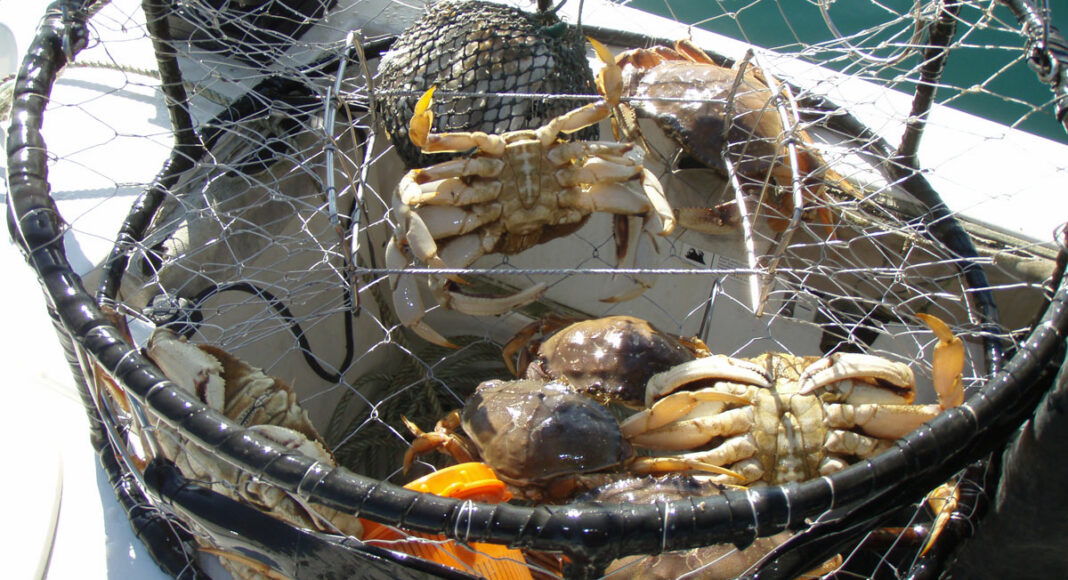New regulations and price strikes delayed the start of the season. Now, Dungeness crab fishermen face the worst catch numbers in decades. As challenges mount, many of them worry about the future of their fishery.
After 71 whales became entangled in fishing gear in 2016, the Center for Biological Diversity sued the California Department of Fish and Wildlife (CDFW). The settlement resulted in the Risk Assessment Management Program, known as RAMP. Under these new regulations, CDFW monitors for humpback whales, blue whales and leatherback sea turtles and can delay or halt Dungeness crab commercial fishing if they determine that the risk of entanglement is high.
That happened twice at the beginning of this season. The presence of humpback whales kept the fishermen out of the water from the originally scheduled start date of Nov. 15 until Dec. 23.
Some fishermen, like Ben Platt, president of the California Coast Crab Association, worry that the new regulations will squeeze the season into a few months every year.
“It’s going to change this fishery, especially in Central California,” he says. This is concerning, he explains, because many fishermen rely heavily on Thanksgiving markets.
Half Moon Bay-based fisherman Tim Obert agrees. “The Thanksgiving market’s huge for us,” he says. “The RAMP has taken that out.”
Fishermen are also concerned that the later start dates make the job more dangerous for smaller boats. As winter storms bring larger swells, “guys start going a little extreme to get out there when it opens,” Obert says.
Watching recreational fishing continue as normal adds to the frustration. “It’s great that they have the opportunity, but their rope is no different than my rope. Their buoy is no different than my buoy,” Obert says.
Clawing Back
The number of whale sightings that trigger a closure depends on population numbers. The National Oceanic and Atmospheric Administration (NOAA) estimates that around 2,900 humpback whales live off the west coast for part of the year — around one-fifth of what the population used to be.
But some fishermen say the numbers are outdated. They want new estimates. “We’re hopeful that triggers for closures will change based on new stock assessments for humpback whales,” Platt says.
If that doesn’t work, the California Coast Crab Association might try filing a petition to delist the species from the Endangered Species Act. “Litigation should always be the last resort,” Platt says. “But we are definitely willing to litigate if that’s what it takes to protect this fishery.”
Platt and Obert say the new regulations are unnecessary and over the top. They cite better gear management and a whale entanglement working group that began making recommendations for best practices in 2015.
“It was kind of a slap in the face for us as fishermen,” Obert says. “We had just had a great season of not interacting with these whales.” In 2019, NOAA traced three humpback whale entanglements back to commercial Dungeness crab fishing in California. The agency could not identify the source of several other entanglements.
Despite the frustrations, the fishermen don’t blame CDFW. “I don’t really hold it against the department so much,” Obert says. “They had their arms tied from the lawsuit with CBD [the Center for Biological Diversity].”
The fishermen remained collaborative and cooperative throughout the closures, says Ryan Bartling, a CDFW senior environmental scientist.
“There are always differing views, but during the delays and the initial surveys that ultimately resulted in the delay, we were working with the [fishing] fleet,” he says. “I think we’re on the right path, and it’s just going to take everybody working together to solve this problem.”
Even though some fishermen want the RAMP regulations to change, they say that they still want to help protect endangered species.
“We started these jobs because we love the ocean. We love the wildlife,” Obert says. He feels that fishermen often get portrayed as “people out there just taking everything we can and making money.”
But many fishermen see the occupation as a way of life rather than a job. “I always thought that I’m never going to get rich, but I’ll have a good life,” Obert says. “It’s a tough pill to swallow, to see things start crumbling to the point where you don’t know if it’s going to be able to come back.”
In a Pinch
After the two delays, the fishermen entered price negotiations with major buyers. When most of them finally made it out on the water in early January, a new challenge arose: The crabs seemed to have disappeared.
“This crab season in terms of catch is the worst one I’ve seen personally since 1999 in California,” Platt says.
Obert experienced the same. “I’ve never seen it worse than this my whole life,” he says.
Platt, who began fishing at nine years old and has owned boats for 25 years, doesn’t feel alarmed. “Most of us that have been around for a while just think were in a down-cycle year,” he says. But while populations vary naturally depending on ocean conditions, climate change and ocean acidification could make it harder for eggs and larvae to survive and weaken the stock’s ability to rebound.
Platt remains hopeful. “I’ve been hearing that it’s the end of days for commercial fishing since I was nine years old,” he says.
But he acknowledges that things are changing.
“More and more every year, we have to fight just to be able to do it,” he says. Amid new regulations and an ever-changing ocean, “we’ll have to stay engaged in this process until we hang up our boots.”













